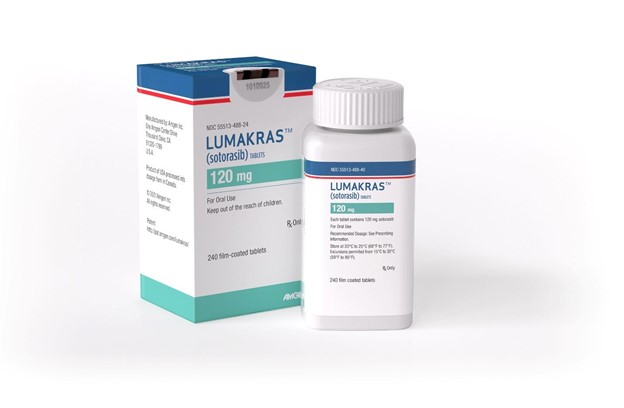The US Food and Drug Administration (FDA) has granted approval to Amgen’s KRAS inhibitor Lumakras (sotorasib) as the first treatment for non-small cell lung cancer (NSCLC) harboring the KRAS G12C mutation. KRAS mutations have previously been considered ‘undruggable’ targets, but they have been a big focus in cancer research as they are one of the most common gene mutations across all cancers. The sotorasib approval is therefore a major breakthrough in the world of cancer and targeted therapies.
The oral treatment was approved for adults with locally advanced or metastatic NSCLC, as determined by an FDA-approved test, who have received at least one prior systemic therapy.
Sotorasib was approved three months ahead of schedule under the FDA’s Accelerated Approval pathway.
Lung cancer is one of the most common cancers and is the leading cause of cancer-related deaths world-wide. NSCLC accounts for approximately 84 percent of the 2.2 million new lung cancer diagnoses each year worldwide, including approximately 236,000 new cases in the US.
Related: LabCorp Backs Resolution Bioscience’s Liquid Biopsy Test for NSCLC
The KRAS gene encodes the K-Ras protein which is part of the Ras family of small GTPases that act as molecular messengers that relay signals into the nucleus. They are involved in regulating cell growth and division.
KRAS mutations are found in nearly a quarter of all cancers. About 13 percent of patients with NSCLC in the US have the KRAS G12C mutation, making it one of the most prevalent driver mutations in this subset of lung cancer. They are also frequent drivers in lung, colorectal and pancreatic cancers, driving 32 percent, 40 percent and 85 to 90 percent of cases, respectively. Among the KRAS mutations, G12C, G12D and G12R are some of the most common KRAS mutations.
Given their importance as cancer drivers, Ras proteins including K-Ras have been difficult to ‘drug’ due to their odd shape that includes a lack of pockets and grooves on the surface for drug-binding.
“KRAS has challenged cancer researchers for more than 40 years with many deeming it as ‘undruggable,’” said David M. Reese, executive vice president of R&D at Amgen, in a company press release.
He described Amgen’s Lumarkas development program as being “a race against cancer for Amgen’s scientists and clinical trial investigators who together have now successfully delivered this new medicine to patients in less than three years — from first patient dosed to US regulatory approval.”
Sotorasib nabbed the accelerated approval based on response rates in a subset of patients (n=124) in the CodeBreaK 100 study of NSCLC patients with KRAS G12C mutations. The study is the largest clinical trial conducted to date exclusively for patients with the mutation. The 124 patients in the trial had received prior treatment with a checkpoint inhibitor (immunotherapy), platinum-based chemo or both, and their disease had advanced thereafter. Sotorasib demonstrated favorable efficacy and tolerability among the patients in the trial.
The major outcomes evaluated in the trial were objective response rate (ORR), which is the proportion of patients whose tumor is destroyed or reduced, and duration of response (DOR) after receiving an orally administered, once-daily 960 mg dose of sotorasib. The study found an ORR of 36 percent, i.e. tumors shrank by at least 30 percent in 36 percent of patients. Among these respondents, 58 percent responded for six months or longer, with ten months being the median DOR.
As part of the evaluation for the accelerated approval, the FDA is requiring a postmarketing trial to investigate whether a lower dose of 240 mg will have a similar clinical effect.
“KRAS mutations have long been considered resistant to drug therapy, representing a true unmet need for patients with certain types of cancer,” said Richard Pazdur, director of the FDA’s Oncology Center of Excellence and acting director of the Office of Oncologic Diseases in the FDA’s Center for Drug Evaluation and Research.
KRAS mutations may now be actionable targets thanks to sotorasib. The drug is also currently being evaluated in other solid tumors.
Profiling tumors for molecular biomarkers like KRAS mutations has been a part of the growing personalized medicine approach in cancer treatment. Key to this is ensuring the availability of pertinent biomarker testing. To address this, Amgen has been working with diagnostics partners Guardant Health and Qiagen, as well as various pathology and hospital groups, to make sure biomarker testing is available, Amgen VP and Therapeutic Area Head, Oncology Greg Friberg told FiercePharma in an interview. Companion diagnostics from the companies also received FDA approvals alongside sotorasib.
Akin to some of the COVID-19 vaccine developers, Amgen gained a head start on manufacturing sotorasib doses so they could be delivered immediately once the FDA came through with its decision. Amgen has submitted applications for approval of Lumakras to regulatory agencies in the EU, Switzerland, the UK, Canada, Brazil and Australia.
Amgen disclosed that the drug will have a list price of $17,900 per month. According to analysts at Jefferies, Lumakras could bring in at least $100 million in sales this year.












Join or login to leave a comment
JOIN LOGIN